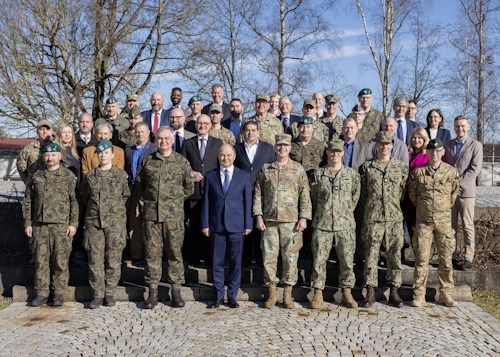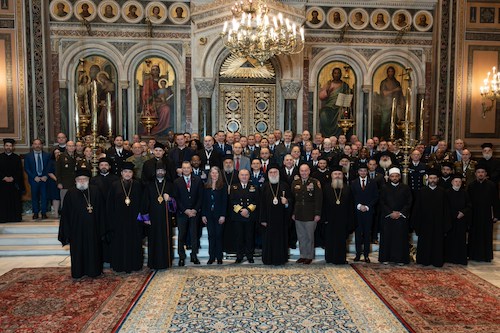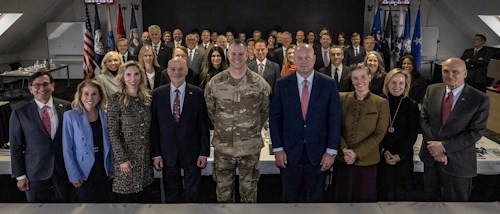PETTY OFFICER SECOND CLASS SEAN CASTELLANO: Hello everybody. I'm Navy Petty Officer Second Class Sean Castellano. I work for AFN Stuttgart, but I am here filming a pilot episode of something we're calling "Inside EUCOM" where we want to get to know all of the different EUCOM directorates and there's a lot of different personnel over there at EUCOM. So I want to, kind of, dive into what all of these personnel do and what their function is over there at the U.S. European Headquarters. So, with that being said I am joined by the EUCOM Chaplain, Command Chaplain, that is, Colonel Kleet Barclay. So sir, first of all, thank you for joining us here.
COLONEL CHAPLAIN KLEET BARCLAY: Thank you. It's good to be here.
P.O. CASTELLANO: And so what is your role over at EUCOM?
COL. BARCLAY: So as a command chaplain, my -- my role is -- I have several but one of the primary one is to provide strategic guidance and information to our U.S. EUCOM leaders as well as the chaplain for the Joint Chiefs of Staff and the Service Chiefs of Chaplains. And -- and that guidance or information may involve stuff about religion, ethics, morale, where morals going on within the EUCOM theater.
P.O. CASTELLANO: So you mentioned that it's probably a lot different being here at a Combatant Command Headquarter rather than other duty stations you've been at. Tell me a little bit about your career and other places you've been before this?
COL. BARCLAY: So actually I started out as an enlisted security police back in the day and -- and after you sit on the fight line and -- and do a lot of security stuff. I say there's room for repentance and -- and so in that process I eventually became a chaplain and I started out at Lackland in the Air Force where we have all of our trainees come in. So I had three years of student ministry and then I was at Travis Air Force Base in California doing what we call flight line ministry and working with pilots and maintainers. From there I went to Kadena in Japan and worked with the special operators throughout the Pacific area there. Back to Maxwell, when I say back that's because we do our chaplain training but I was actually assigned there and worked with a different level of student ministries. Because you have a lot of officer training going on there. And from there I went to the Pentagon and worked in the -- the Chief of Chaplain's Office for the Air Force and really got an inside -- to some of the strategic -- strategic issues that goes on with the -- the issues of plans and personnel. That was -- that was quite an interesting and -- and challenging too. Then to Hurlburt Field where it was -- with the Special Ops again and from there eventually became the Commandant of the Air Force Chaplain Corps College and there we train all the chaplains from cradle to grave about how they do their job. Whether it's entry level chaplain or as a senior level chaplain and my last assignment is here at EUCOM. P.O. CASTELLANO: So this is actually where you're going to finish out your career here at EUCOM.
COL. BARCLAY: Well, I should say my current assignment.
P.O. CASTELLANO: Got it. Got it. Got it.
COL. BARCLAY: In theory I have six more years left unless my wife or children tell me otherwise.
P.O. CASTELLANO: We'll see. Huh?
COL. BARCLAY: Yes.
P.O. CASTELLANO: How do you guys like Germany? How do you like being stationed over here?
COL. BARCLAY: We -- we enjoy it. We've been here about a year and a half. Obviously COVID is -- has nixed some of our plans, not just personal and family plans but a lot of my -- my military duties have kind of been challenged as well.
P.O. CASTELLANO: Sure. So, that being said, you -- you brought up COVID. One of the things I've heard from the chaplain seat has been the word resiliency and so I, kind of, want to dive into that. What is the word resiliency mean to you? And how does that impact the people that serve over at EUCOM?
COL. BARCLAY: Well, I -- I've got to say that resiliency has been a buzzword in the military probably for 10 years now. But -- and -- and maybe it's become overused or -- or there's a lot of expectations when you say the word resilience to fix something. The -- the truth of the matter is, is resilience is built over time and is built out of maybe crisis or -- or chaos and -- and so we can't fix things that quickly. But you can -- you can do some pre-work in -- in resiliency and that's -- that's where you'd tie in things like your physical, your spiritual, your mental and your social health. You do things prior to an incident so that you'll be able to bounce back quicker. The other thing about resiliency is, I think it's important to recognize in order to be resilient, it means that you have to come back up from something. And -- and I know leaders would prefer that we never have downs but it's just the way life is.
P.O. CASTELLANO: It's inevitable.
COL. BARCLAY: Yes. We're going to -- we're going to struggle and so resiliency is the -- the ability to bounce back and maybe bounce back quicker or to bounce back with less challenges in the process.
P.O. CASTELLANO: So the -- the folks that you work with the chaplaincy over there at EUCOM. In what kind of ways do you guys help out the resiliency of the people that serve at EUCOM? What -- and what fashion can people reach out to you and, kind of, interact with you I guess?
COL. BARCLAY: Well, a lot of what the chaplains will do throughout the theater is, they're going to be doing counseling and -- and obviously with COVID, counseling has had to change. For a while, they couldn't do any face to face counseling and so they -- they had to get permission to do it online or virtual counseling. And there's some ethical issues with that, you know, they -- we still have to make sure that we protect the confidentiality of -- of the client or the person we're seeing. So counseling is one of the -- the ways we help in resiliency. The other thing, I -- I know some people would -- would, they would probably be surprised at the value of -- of religious and spiritual health. The ability for people to worship does much more than -- than help their soul. There are physical benefits. There are social benefits. There are a lot of benefits across the board that as people engage in that, that spiritual and religious health aspects. They're going to be better off. They'll be more resilient facing whatever challenges come their way.
P.O. CASTELLANO: So speaking of you sir, one point you mentioned that there's been some challenges due to COVID and you guys started to do virtual counseling for a while. Are -- are there any other challenges that you guys have faced during COVID and how you overcame those challenges?
COL. BARCLAY: Well, so counseling we do, obviously worship service, that's a big thing we do and -- and so for a while there was some where there were no worship services allowed depending on what nation some of our chaplains were in.
P.O. CASTELLANO: Right.
COL. BARCLAY: And -- and -- and then we were able to start doing them virtually and -- and that's -- that's helping. We're still doing them virtually. A fair amount of the folks because of their own personal health issues or concerns are still attending virtually and others are able to come into the -- the chapel. But -- but to be able to do that it's -- it's been a -- a challenge for us because unlike you, we're not used to being behind a -- a -- a microphone and camera quite the same way.
P.O. CASTELLANO: Sure.
COL. BARCLAY: And also we feed off of that personal relationship, that social interaction and so when you don't see the people on the other side of that virtual screen it -- it's a little bit of a struggle.
P.O. CASTELLANO: Well, sure and that's a challenge that probably everybody has faced in some way of another during COVID. Right?
COL. BARCLAY: Absolutely.
P.O. CASTELLANO: Don't have that face to face interaction even for us even here to be able to do this we have to be sure that we're six feet apart exactly, had the masks on, all that stuff. So, definitely that's just the climate of the world, I guess, the way it is right now. One more thing I want to ask you, at least here. You talked about, like, supporting service members. You talked about you guys run services. You do counselings. Are you here primarily to support service members or does your reach go further than that? Do you also work with family members and who all do you guys work with?
COL. BARCLAY: Yes. They -- we do work with family members, dependents and also the civilian populous. And you -- you might not see the same degree of support for the civilian populous back in the states but here we recognize that sometimes we're the only religious providers that are going to speak the same language. And -- and so we are more apt and -- and able to work with civilians as well.
P.O. CASTELLANO: Have there been any, I guess, challenges to -- that are unique to this duty station that are unique to working at a combatant and command? I'm sure, at least, your, I guess, your personnel that are assigned to U.S. European Command Headquarters might be a little bit different than another unit. So, are there any facets that have been challenging for you working for EUCOM Headquarters?
COL. BARCLAY: Well, I -- I would say different and -- and challenging in a -- in a -- in it's own right but more so different just because the folks here have -- usually they're more advanced in their careers, and so they have different problems than -- than if I was, say, doing student ministry work. People are just off the street and trying to figure out how to adjust to the military. So the problems are different. And we also run into, given the life cycle that a lot of people are in, you know, they're going to be concerned about what their kids are doing in high school or what their parents are doing. The health of their parents is very different than someone coming in off the street and -- and so a lot of our -- our personnel, their parents are in their 70s and 80s and 90s. And so COVID has really impacted them because not only are they have to -- do they have to do their leadership positions and be concerned about their personnel, but really their families. Their extended families are -- are struggling with COVID.
P.O. CASTELLANO: Yes. Can only imagine. So, EUCOM's AOR is pretty massive. It's comprised of, is it 50 nations?
COL. BARCLAY: Fifty nations.
P.O. CASTELLANO: And with that being said with all those different nations within this AOR, do you ever have to reach out to any members from different countries around Europe here?
COL. BARCLAY: Absolutely. A matter of fact, that's a big part of my job. Pre-COVID and -- and it's changed during COVID but within EUCOM we have between 32 to 37 nations that have chaplaincies. The reason I say 32 or 37, it kind of depends on how you define a chaplaincy. Some of these nations only have one chaplain that's going to support their whole nation, their whole military and -- and they might be dual or triple hatted with other duties as well. So when -- when you talk about chaplaincies, unlike the U.S. chaplaincy where we, for example, the Air Force has around 540 chaplains. Many nations don't have anything near that. Nevertheless, we do a lot of engagements with them and we -- we work towards interoperability on the exercises. And as a matter of fact, our office just hosted the International Military Chiefs of Chaplains Conference at the end of January and we had chaplains from 38 nations. There are about 118 individuals from 38 nations and some of those were even outside of EUCOM. Some of them were from AFRICOM and from INDOPACOM as well. Because this conference, excuse me, has been going on for 32 years and -- and so there's a history to it and that's where we talk about how do we be interoperable and how do we cooperate in -- in case there is a -- a crisis or contingency.
P.O. CASTELLANO: That's really interesting to hear. I -- I wouldn't have thought that'd be something that you guys -- that's -- do. That's super interesting. I guess that's one way that you support. I think it's the commander’s second priority -- allies and -- strengthening ties with allies and partners. That has to be a pretty rewarding experience for you too. Is it not?
COL. BARCLAY: Well, absolutely it's -- it's incredible to see what -- what some of these other chaplaincies do that maybe different than us or similar to us. And -- and also the role of religion in -- in some of the European nations is -- is very different than the United States and so when you see how prominent religion may be, it -- it's -- from my -- my perspective. It's pretty inspiring the way they'll look to religion and also, I guess, the other thing we should tie in is the State Partnership Program. So we have -- we have state chaplains back in the United States who are -- who are partnered with some of these -- these nations. And so we're coordinating to make sure that -- that our efforts are in sync not only with the state -- excuse me, what the state chaplain is doing but it -- it aligns with EUCOM's priorities.
P.O. CASTELLANO: Makes sense and it kind of have that message alignment. That's something we hear in public affairs a lot and I'm sure you hear that being a chaplain as well.
COL. BARCLAY: Yes. And we don't want to -- when I -- when I talk about the size of chaplaincies, we don't want to overwhelm a nation's chaplaincy because they're talking to the -- the state chaplain from Colorado and then they're talking to the USAREUR command chaplain, the NAVEUR command chaplain, or USAFE command chaplain. Then the EUCOM command chaplain and so we -- we need to make sure that we -- we're -- we're talking about the same things and -- and we're -- we're working towards the same things.
P.O. CASTELLANO: Absolutely. Well, sir, I want to thank you again for taking the time to join us. We really appreciate everything you said. I've learned a lot about the Chaplains Department over at EUCOM. So I appreciate it.
COL. BARCLAY: Thank you. Looking forward to more opportunities.
-END-




